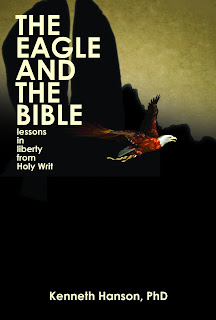I was musing with my class today: What a pity, that people compartmentalize their lives into little boxes; and they have this box called “religion,” into which they stick the Bible and whatever sanctimonious prattle they imagine goes along with it. So, the Bible gets read purely as a “religious” book, even though relatively little of it has to do with what modern folk think of as “theology.” Rather, it’s about human behavior, ethics, justice, a whole lot of law, and … politics!
That’s the theme and message of my new (and 6th) book, The Eagle and the Bible. The Good Book is really “good politics”! Furthermore, we can find endless parallels between the stories recounted in its narratives and the American experience, especially the struggle against tyrannical government. I’ve in fact isolated a political, “revolutionary” current – anti-establishment and anti-big government – in Holy Writ that’s as deliciously “subversive” today as it was back in the days of David, Solomon, and yes, Moses. Were these heroes of the Bible the great religious leaders they are made out to be, or were they much closer to biblical “tyrants,” opposed by a good many of the Israelites themselves? Here’s a book that dares to question traditional interpretations, not to cast doubt on the Bible, but to demonstrate just how relevant it is to the greater debate today, when so many feel that government is basically out of control, and cannot be trusted.
The great divide over the role of government is certainly not foreign to American history. But how many people, when they read the Bible, also recognize the “great divide” between those Israelites who favored an all-powerful central government, and those who favored a loose “confederation” of tribes? Is that any different from the debates in early America between the Federalists (Alexander Hamilton, John Adams and others), who preferred strong central authority, and the Anti-Federalists (Patrick Henry, Thomas Paine, Samuel Adams and Thomas Jefferson), who advanced the cause of “states rights”? In ancient Israel, the issue was “tribes rights,” and in both cases the end result was civil war.
My goal is to stir up a whole new respect for the Bible, as a masterful political work, that can tutor us through the great issues of the day, if we’re bold enough to peek beneath the surface and seek out the political conflict that underlies the whole narrative. As I tell my students: Conflict drives everything!
